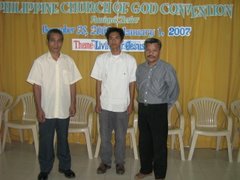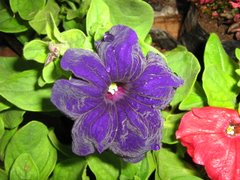Are There Sinning Christians? - W. D. McCraw
It is not always true that a man is “inwardly” what he professes, or appears to be, outwardly. Sheep’s clothing” here means religious profession. While he professes to be a Christian, inwardly he is wicked and sinful. How are we to discern “between him that serveth God and him the serveth Him not? Ye shall know them by their fruits. Do men gather grapes of thorns, or figs of thistles? Even so every good tree bringeth forth good fruit; but a corrupt tree bringeth forth evil fruit. Vss. 16,17. Solomon said, “Keep thy heart with all diligence; for out of it are the issues of life.” —Prov. 4:23. Jesus said again, “For out of the heart proceed evil thoughts, murders, adulteries, fornications, thefts, false witness, blasphemies: these are the things which defile a man.”—Matt. 15:19,20 What a man does proves what he is. If he sins, he is a sinner. If he steals, he is a thief. If he commits murder, he is a murderer. If he lies, he is a liar. John says, “He that doeth righteousness is righteous, even as He [God] is righteous.”—1 Jn. 3:7 Doing righteousness and unrighteousness are opposites that one cannot do at one time. So one can not be a sinning Christian, for if he does righteousness he cannot do unrighteousness, and “whosoever doeth not righteousness is not of God (1 Jn. 3:10). Hence the grace of God enables us to “live soberly, righteously, and godly in this present world.”—Titus 2:12 [That same grace that brings salvation also teaches us to live “godly in this present world”. Vs. 11] The Lord knoweth how to deliver the godly out of temptations,…—2 Pet. 2:9
Some claim that while the spirit is cleansed and pure, yet the “old body,” “these vile bodies,” sin constantly. According to Jesus Christ, the responsibility for sin of every form is charged to the heart, or the inner man. He said, “For from within, out of the heart of men, proceed evil thoughts, adulteries, fornications, murders, Thefts, covetousness, wickedness, deceit, lasciviousness, an evil eye, blasphemy, pride, foolishness: All these evil things come from within, and defile the man.”—Mark 7:21-23 It is said that we shall be judged according to the deeds done in the body.—Rom. 2:5 and 6 It would be a terrible thing for our spirits to be judged and sentenced to eternal perdition in that day over which the soul had no control. But the fact is, “Every sin that a man doeth is without the body;—1 Cor. 6:18. It is all conceived in the soul and the body is only the instrument of the soul in carrying it out. God said, “The soul that sinneth, it shall die.”—Ezek. 18:4
Jesus said, “Blessed are the pure in heart: for they shall see God.” —Matt. 5:8 If the heart is pure, the life will be pure; for out of the heart are the issues of life and “out of the heart the mouth speaketh.” So the tongue is not responsible, but the heart. Get the heart cleansed and the life will be clean. “Woe unto you, scribes and Pharisees, hypocrites! for ye make clean the outside of the cup and of the platter, but within they are full of extortion and excess. Thou blind Pharisee, cleanse first that which is within the cup and platter, that the outside of them may be clean also.”—Matt 23:25, 26 Again Jesus said, “O generation of vipers, how can ye, being evil, speak good things? for out of the abundance of the heart the mouth speaketh. A good man out of the good treasure of the heart bringeth forth good things: and an evil man out of the evil treasure bringeth forth evil things.”—Matt. 12:34, 35 Here, Jesus declares that the reason for all the evil thoughts and words of the Pharisees concerning Him was that they were evil themselves.
The prophet said that “The heart is deceitful above all things, and desperately wicked: who can know it?”—Jer. 17:9 Such is the unregenerate heart, and for that very cause God said He would give us a “new heart.” The new heart is a clean heart. “Create in me a clean heart, O God; and renew a right spirit within me.”—Ps. 51:10 “Seeing ye have purified your souls in obeying the truth through the Spirit unto unfeigned love of the brethren, see that ye love one another with a pure heart fervently: Being born again, not of corruptible seed, but of incorruptible, by the word of God, which liveth and abideth for ever.”—1 Pet. 1:22, 23 Thus we see that God made provision in the plan of salvation for the purification of men’s hearts or souls. Since no fountain can send forth bitter water and sweet, and out of the mouth proceed the issues of life, and out of the abundance of the heart the mouth speaketh, it is necessary to purify the fountain of life, if the stream is to be pure. So God has provided for such cleansing. “If we walk in the light as He is in the light, we have fellowship one with another, and the blood of Jesus Christ His Son cleanseth us from all sin.”—1 Jn. 1:7
In 1 Jn 1:8 many are confused because it seems to contradict all the Scriptures that I have cited in defense of a sinless life. Not only so, but it seems to contradict all the Scriptures in the Bible that affirm that Christians can and do live without sinning in this world. It would be a sad thing indeed if the Word of God contradicted itself. Then we should be like a ship without a rudder, left to drift about the stormy sea of life and finally be wrecked on the awful breakers of eternal despair. The Word of God does not contradict itself.
“If we say that we have no sin, we deceive ourselves, and the truth is not in us.” 1 Jn.1:8 Taken apart from the context this verse would teach that we all have sin, or are sinners; but taken in connection with the context it is as simple as a-b-c. John is telling us that “if we walk in the light, as He is in the light, we have fellowship one with another, and the blood of Jesus Christ His Son cleanseth us from all sin;” then he says, “If we say that we have no sin, we deceive ourselves” that also is true. The Scriptures teach that “all have sinned and come short of the glory of God.” —Rom. 3:23 (Through the fall of Adam) Since all have sinned, anyone thinking himself pure without the cleansing blood of Christ would certainly be deceived; but if we, as is stated in the next verse, “if we confess our sins, He (Christ the second Adam) is faithful and just to forgive us our sins, and to cleanse us from all unrighteousness.”
The real truth as taught by John here is simply this: No man is pure of himself, but all have sinned, and our only hope for deliverance is the blood of Jesus Christ, the Son of God. And if we confess that we are sinners and repent and turn away from our sins, God will cleanse us from all sin. Now, after we are cleansed from all sin [unrighteousness], how much is there left? None. “If we confess our sins, he is faithful and just to forgive us our sins, and to cleanse us from all unrighteousness.—1 Jn. 1:9 Now, until the blood is applied and we are cleansed from all sin, if we should say, or even think, that we have no sin, we would certainly be deceived; but, on the other hand, if after the blood is applied and we are cleansed from all sin if we should still think or say that we are sinners, we would be deceived also. If we are cleansed (and the word “cleanseth” means cleansed and kept clean as long as we walk in the light and are obedient to the Word of God), we are not defiled, and since the blood cleanses from all sin, then it is taken away, and our souls are pure, and the life is pure also. “Unto him that loved us, and washed us from our sins in his own blood,”—Rev. 1:5
Surely it would be a bad job of washing if He should leave some of the little sins, or dirt spots on our souls. “Nevertheless we, according to his promise, look for new heavens and a new earth, wherein dwelleth righteousness. Wherefore, beloved, seeing that ye look for such things, be diligent that ye may be found of him in peace, without spot, and blameless.”—2 Pet.3:13,14 “Thou hast a few names even in
Awake to righteousness, and sin not; for some have not the knowledge of God: I speak this to your shame.—1 Corinthians 15:34


















































































































